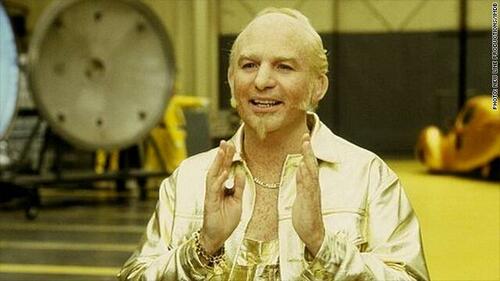
Authored by Mark Thornton via The Mises Institute,
This week, we explain how Warren Buffett, Dave Ramsey, and John Maynard Keynes are wrong about gold.
John Maynard Keynes, the Godfather of Keynesian economics, famously called gold the “barbarous relic,” a term he used to denigrate the gold standard and to disparage the use of gold as money.
Specifically, he hated the constraint the gold standard placed on government spending. If the government prints too much currency that can’t be redeemed in gold, then it must cut back its spending, bringing on a recession or depression, or face runaway price inflation in the economy.
Following in Keynes footsteps, investment whiz kid Warren Buffett, son of the great investor and Congressman, Howard Buffett, has famously disparaged gold as an investment, saying it has “no yield.” He otherwise has voiced no coherent political philosophy, like his father.
Hotshot Radio voice, Dave Ramsey, has likewise sharply disparaged gold as an investment, saying it’s just a “shiny, shiny rock,” with no yield, and is a terrible investment.
Gold in Society
Of course, in this “age of inflation,” people like Buffet junior and Ramsey are heralded for their calls for prudence in what otherwise is a financial landscape warped by hedonistic government policies of spending, borrowing without limits, and printing fiat money by the trillions.
I will show here how wrong all three men are on all the investment points and even how contradictory their views on gold are, but I must emphasize that I am not offering any kind of investment advice here! This is just analysis and commentary on the current scene.
This hatred and disparagement of gold as money and the gold standard has become standard dogma of and a pillar of the modern state.
In complete contrast, regular people in society still instinctively see gold as an emblem of excellence more than a half century since the last vestige of the gold standard was taken away from us.
Gold medals represent the very best achievements; silver medals represent the next level down.
Teachers and parents still use the “star system” with gold or yellow stars representing the highest achievement. From babies to high school students, gold stars are still an inducement to effort and achievement.
Later on in life, gifts of jewelry are used to convey our affection and admiration. First, it might be things like friendship rings, but we all know that gifts of gold jewelry are an attempt to convey a high level of esteem by the gift giver. When the Wise Men visited the baby Jesus they brought gifts of gold, along with the precious perfume-medicinal compounds of frankincense and myrrh.
Even marketers of companies and company products—where there is a profit and loss prime directive—strive to be able to claim that their company, their product, or their service is “the gold standard” in their industry, or with their customers.
When humans started to see the world in terms of its elements, humanity took off! The Bronze Age: society, culture, religion, buildings, science, etc.—gold was the rarest and most precious, even cherished, of them all. Human history is replete with gold exclamations whether it is culture, religion, art, and now technology and even medicine! The greatest age of peace and prosperity is the gold standard era of the 19th century!
Investment Comparisons
First of all, gold is not primarily an investment. Gold and silver are monies, the most advanced forms of money for thousands of years before the “age of inflation.”
Technically, gold and silver are not money now, but only because they were forced out of that role by the state. Gold shackles the state; paper money unleashes it from its golden cage. Murray Rothbard explains this in his What Has Government Done to our Money? This is such an important work.
Obviously, if gold and silver are money, you don’t need to “invest” in gold and silver, as you are already keeping some large percentage of your net worth in cash balances, checkable deposits, savings deposits, and gold- or silver-denominated bonds and insurance policies.
I remember as a kid that after we were taken off the gold standard that investment advice typically recommended, say a 20% cash holding position, with say half of that in cash funds for personal use and emergencies and half in precious metals for reasons such as inflation protection. The rest of your net worth statement would be in investments such as stocks, bonds, and real estate. The cash type holdings were not considered investments, but were for emergencies, diversification, and to take advantage of investment opportunities as you built bigger cash holdings.
Of course, this cuts off Warren Buffett’s objections at the knees. He is after all the “king of cash,” often with mountains of cash on the balance sheet of his company. Yes, this cash does earn a yield, which might be important to his investors, but the cash yield is also subject to the inflation premium tax and all the government taxes too. The risk of loss has been very low.
Gold can underperform stock investments. However, when I took a look at the average closing prices for gold, the Dow, and the S&P 500, during 1971—when we were taken off the gold standard—and last year, 2023, dividing 2023 into 1971, gold went up 47 and a half times, the Dow went up only 38.6 times, and the S&P 500 only went up 44.6 times.
So, gold actually wins that simple comparison over the 52-year period. It’s a “simple” comparison because it doesn’t include reinvested dividends, where stocks would win, and it doesn’t include capital gains taxes on stocks or fees, which would hurt stocks, and it doesn’t include the annual safety deposit box fee where for less than $100 per year you can rent a box in a bank that would hold a large amount of gold and your important papers.
Again, my points are not a matter of financial advice, or that gold is a superior investment, it’s just to point out that Mr. Buffet and Mr. Ramsey don’t know what they are talking about and have failed to look at the facts of history—any kind of history—in voicing their “opinions.”
In fact, I’m not even suggesting that putting all your money into gold or silver is a great idea! In the past, investment advisors simply recommended that part of our cash investments be in precious metals to protect long run purchasing power, a diversification asset, and something to balance your net worth statement. It also helps build your “buy and hold” mentality towards savings because gold and silver come with transaction fees and difficulties—less than real estate, but more than typical stocks today, or just using your debit card.
In the end result, John Maynard Keynes was a socialist who preferred more of an absolutist state that could do much as it pleases, including unrestricted borrowing and spending. The anti-gold dogma generated by the Federal Reserve’s propaganda machine is intensely strong among us. Mr. Buffet and Mr. Ramsey swallowed that statist creed hook, line, and sinker.
* * *
We have kicked off the Fall Campaign at the Mises Institute. I humbly request that you make a small donation in the name of this podcast using the link in the show notes. It would mean a great deal to me. For every $100 or more donation, or recurring donation of $5 or more, using this link, I will send you a signed copy of my Skyscraper Curse book: mises.org/mi5
Authored by Mark Thornton via The Mises Institute,
This week, we explain how Warren Buffett, Dave Ramsey, and John Maynard Keynes are wrong about gold.
John Maynard Keynes, the Godfather of Keynesian economics, famously called gold the “barbarous relic,” a term he used to denigrate the gold standard and to disparage the use of gold as money.
Specifically, he hated the constraint the gold standard placed on government spending. If the government prints too much currency that can’t be redeemed in gold, then it must cut back its spending, bringing on a recession or depression, or face runaway price inflation in the economy.
Following in Keynes footsteps, investment whiz kid Warren Buffett, son of the great investor and Congressman, Howard Buffett, has famously disparaged gold as an investment, saying it has “no yield.” He otherwise has voiced no coherent political philosophy, like his father.
Hotshot Radio voice, Dave Ramsey, has likewise sharply disparaged gold as an investment, saying it’s just a “shiny, shiny rock,” with no yield, and is a terrible investment.
Gold in Society
Of course, in this “age of inflation,” people like Buffet junior and Ramsey are heralded for their calls for prudence in what otherwise is a financial landscape warped by hedonistic government policies of spending, borrowing without limits, and printing fiat money by the trillions.
I will show here how wrong all three men are on all the investment points and even how contradictory their views on gold are, but I must emphasize that I am not offering any kind of investment advice here! This is just analysis and commentary on the current scene.
This hatred and disparagement of gold as money and the gold standard has become standard dogma of and a pillar of the modern state.
In complete contrast, regular people in society still instinctively see gold as an emblem of excellence more than a half century since the last vestige of the gold standard was taken away from us.
Gold medals represent the very best achievements; silver medals represent the next level down.
Teachers and parents still use the “star system” with gold or yellow stars representing the highest achievement. From babies to high school students, gold stars are still an inducement to effort and achievement.
Later on in life, gifts of jewelry are used to convey our affection and admiration. First, it might be things like friendship rings, but we all know that gifts of gold jewelry are an attempt to convey a high level of esteem by the gift giver. When the Wise Men visited the baby Jesus they brought gifts of gold, along with the precious perfume-medicinal compounds of frankincense and myrrh.
Even marketers of companies and company products—where there is a profit and loss prime directive—strive to be able to claim that their company, their product, or their service is “the gold standard” in their industry, or with their customers.
When humans started to see the world in terms of its elements, humanity took off! The Bronze Age: society, culture, religion, buildings, science, etc.—gold was the rarest and most precious, even cherished, of them all. Human history is replete with gold exclamations whether it is culture, religion, art, and now technology and even medicine! The greatest age of peace and prosperity is the gold standard era of the 19th century!
Investment Comparisons
First of all, gold is not primarily an investment. Gold and silver are monies, the most advanced forms of money for thousands of years before the “age of inflation.”
Technically, gold and silver are not money now, but only because they were forced out of that role by the state. Gold shackles the state; paper money unleashes it from its golden cage. Murray Rothbard explains this in his What Has Government Done to our Money? This is such an important work.
Obviously, if gold and silver are money, you don’t need to “invest” in gold and silver, as you are already keeping some large percentage of your net worth in cash balances, checkable deposits, savings deposits, and gold- or silver-denominated bonds and insurance policies.
I remember as a kid that after we were taken off the gold standard that investment advice typically recommended, say a 20% cash holding position, with say half of that in cash funds for personal use and emergencies and half in precious metals for reasons such as inflation protection. The rest of your net worth statement would be in investments such as stocks, bonds, and real estate. The cash type holdings were not considered investments, but were for emergencies, diversification, and to take advantage of investment opportunities as you built bigger cash holdings.
Of course, this cuts off Warren Buffett’s objections at the knees. He is after all the “king of cash,” often with mountains of cash on the balance sheet of his company. Yes, this cash does earn a yield, which might be important to his investors, but the cash yield is also subject to the inflation premium tax and all the government taxes too. The risk of loss has been very low.
Gold can underperform stock investments. However, when I took a look at the average closing prices for gold, the Dow, and the S&P 500, during 1971—when we were taken off the gold standard—and last year, 2023, dividing 2023 into 1971, gold went up 47 and a half times, the Dow went up only 38.6 times, and the S&P 500 only went up 44.6 times.
So, gold actually wins that simple comparison over the 52-year period. It’s a “simple” comparison because it doesn’t include reinvested dividends, where stocks would win, and it doesn’t include capital gains taxes on stocks or fees, which would hurt stocks, and it doesn’t include the annual safety deposit box fee where for less than $100 per year you can rent a box in a bank that would hold a large amount of gold and your important papers.
Again, my points are not a matter of financial advice, or that gold is a superior investment, it’s just to point out that Mr. Buffet and Mr. Ramsey don’t know what they are talking about and have failed to look at the facts of history—any kind of history—in voicing their “opinions.”
In fact, I’m not even suggesting that putting all your money into gold or silver is a great idea! In the past, investment advisors simply recommended that part of our cash investments be in precious metals to protect long run purchasing power, a diversification asset, and something to balance your net worth statement. It also helps build your “buy and hold” mentality towards savings because gold and silver come with transaction fees and difficulties—less than real estate, but more than typical stocks today, or just using your debit card.
In the end result, John Maynard Keynes was a socialist who preferred more of an absolutist state that could do much as it pleases, including unrestricted borrowing and spending. The anti-gold dogma generated by the Federal Reserve’s propaganda machine is intensely strong among us. Mr. Buffet and Mr. Ramsey swallowed that statist creed hook, line, and sinker.
* * *
We have kicked off the Fall Campaign at the Mises Institute. I humbly request that you make a small donation in the name of this podcast using the link in the show notes. It would mean a great deal to me. For every $100 or more donation, or recurring donation of $5 or more, using this link, I will send you a signed copy of my Skyscraper Curse book: mises.org/mi5
Loading…





